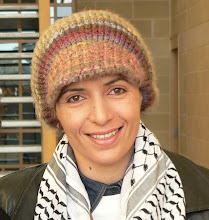It was supposed to be only a short time journey from Fawziya’s home to Tulkarem hospital in the Occupied West Bank. Yet this was not the case with the poor, sick and old woman who has suffered of lungs problems.
When her health conditions deteriorated, Fawziya’s husband, Mohammed, aged 71, decided to take her to the hospital in order to be seen by the doctors who treated her few days ago. At Jbara checkpoint near Dier Al Ghsoun village, their car as many other hundreds of cars, had to be stopped by Israeli soldiers and fawziya as other several hundred people had to wait till a further notice.
After long time waiting, Mohammed headed towards the soldiers and explained the situation of his wife. In an attempt to convince them, the old man kissed the cheek of one of the soldiers telling him that his wife is dying and needs urgently to reach the hospital. The soldier had no practical response but to say that he is acting according to military orders issued by his offcier to block the road. Moahmmed has no other choice but to turn back to his village in search for a docotor.
When they reached the village, Fawziya could not wait longer. She passed away.
In the report published by the Palestinian Center for Human Rights Fawziya story reads as follow,
"At approximately 17:00 on Thursday, 13 February, Fawzia Abd al-Fattah al-Darak (59) from Deir al-Ghosoun north of Tulkarm died when IOF prevented an ambulance from taking her to a hospital in Tulkarm. Mohammad al-Darak, her husband, informed PCHR's fieldworker that his wife started to experience severe chest pain. They called the emergency department of the Palestine Red Crescent Society in Tulkarm in order to transport her to a hospital. However, the IOF troops stationed at the checkpoint to the south of Deir al-Ghosoun prevented the ambulance from entering the village. The woman's family put her in a private taxi and tried to take her to the ambulance. However, IOF troops prevented the vehicle from passing through the checkpoint despite being informed of the woman's condition. The ambulance was waiting on the other side of the checkpoint but the troops did not allow it to pass. The family took the woman back to a private physician in the village. However, she died of a heart attack."
Fawziya was another number that will be added to the statistics and reports of Israeli violations against Palestinian civilian population but not the last victim. So far, there have been hundreds of people whom lost their lives at the Israeli military checkpoints. When such crimes will have an end, is a question raised by many Palestinians. It is no coincidence that an answer to that question has been consistently neglected.
For more details please see the Palestinian Center for human rights report published by the EI
http://electronicintifada.net/v2/article9316.shtml
Facts:
There are over 100 permanent checkpoints in the Occupied West Bank and around 500 temporary ones.
These checkpoints separate Palestinian areas from other Palestinian areas hindering the movement of people, goods, agricultural products and humanitarian aid.
The bleak overall situation of Palestinians and the deterioration of the social and economic situations are a direct result of the oppressive closure policies imposed by the Israeli occupation authorities in the Palestinian Occupied land.
Such policies have confined around 2.8 million Palestinians living in West Bank and 1.5 million living in Gaza for over 40 years.
Nowadays, freedom of movement even for basic needs has been denied and West Bank has become a prison like the one in Gaza -- but it is a slightly bigger.
Saturday, 16 February 2008
Subscribe to:
Post Comments (Atom)
Palestinian refugees sit at Khan Younis refugee camp



No comments:
Post a Comment